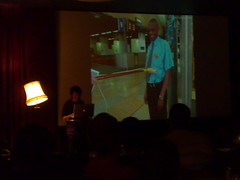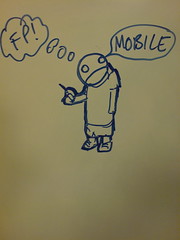This Happened
March 05, 2008 | Comments At 6 o'clock this evening I dashed from the office up to Brighton station and hopped onto a train bound for London Bridge, to make it to This Happened. It was an absolutely enchanting evening of four talks, each running through the background to a product and its design process. It's late and I only have a few scrabbled notes, but I want to get them down whilst the memory is fresh:
At 6 o'clock this evening I dashed from the office up to Brighton station and hopped onto a train bound for London Bridge, to make it to This Happened. It was an absolutely enchanting evening of four talks, each running through the background to a product and its design process. It's late and I only have a few scrabbled notes, but I want to get them down whilst the memory is fresh:
- Jussi Angesleva on the nasty realities of creating digital wave-patterns which seamlessly(ish) transferred themselves into real water, for an installation in Japan. Interesting to hear about the horrors of doing work which integrates with a space without taking it over (or just sticking up a screen and projecting cute stuff onto it). Cue lots of stories on the pain of cross-continental collaboration or "getting your hands dirty at a distance": edit/compile/test in real life. Icky, and unnervingly familiar: the real world is messy, physical proximity and the ability to have conversations wins out over documentation and electronic tools. Hmm, where have I heard that before?
- Mr Schulze gave a slightly downbeat and self-effacing version of the Olinda story. It was refreshing to hear that even geniuses have problems balancing consultancy and their own product development, and a bit sad that the beeb can't produce the Olinda radios: I really hope that someone takes the open source designs and builds them (and that a suitable public back-end can be found for the social goodness which lurks backs them up). I wanted to know more about the modularity of the hardware too - Jack hinted at some smarts behind that side of things.
- Kenichi Okada showed off animal superpowers, my absolute favourite: toys to give children the perspective of animals (giraffe for adult-style height of vision, ant for microscopic sight through "feelers", and bird for a homing instinct). Beautiful looking toys, charmingly simple, wonderfully presented. Timely for me too: I've been thinking a lot about animals recently, and had a blog post on the topic which MarsEdit seemed to drop somewhere :(
- And finally, Hattie Coppard of Snug and Outdoor ran through their experimental playground kit: incredibly cute, kinda life-size lego. And her slide on narrative and play had my Loco-sensors tingling: arenas, pathways, obstacles, territories, thresholds, destinations and sanctuaries being the components of games. What a beautiful way to envisage outdoor play!
All great stuff, all thoroughly recommended. Please don't tell your friends, I think I only just scraped onto the entry list this time around and will be sad to miss the next one :)
Brighton Holistics
March 02, 2008 | CommentsIf you're in Brighton and looking to try something a little different, you could do worse than head along to one of Mark's taster classes for Holistics. Mark's a good friend of mine and has combined elements of Aikido (from which I know him) with all sorts of other stuff into an unusual melange - and he's doing first the class for free, at various venues across Brighton.
Walking with skeletons
February 24, 2008 | CommentsAlistair Cockburn on walking skeletons: "A Walking Skeleton is a tiny implementation of the system that performs a small end-to-end function. It need not use the final architecture, but it should link together the main architectural components. The architecture and the functionality can then evolve in parallel... [It is] permanent code, built with production coding habits, regression tests, and is intended to grow with the system. Once the system is up and running, it will stay up and running for the rest of the project, despite the Incremental Rearchitecture that is quite likely to occur."
Last year we did exactly this for LocoMatrix. We started out by ignoring geolocation, MIDlets, or any of that stuff, and Mr Moxley delivered the simplest client/server game that we could think of, using a subset of our architecture: it was paper, scissors, stone. This involved a small slice of the communications protocol being in place; something server-side to handle basic units of storage (what's a player? what's a game?) and expressing a very simple game logic. I think we managed to get this going in around a week (Jack, correct me if I'm mistaken there).
I was quite pleased with what this approach gave us: working end-to-end code fairly quickly and aspects of the design validated. We didn't have anything running on a phone (which cut the code/test/fix cycle and sped up development of the protocol side of things no end), we didn't have any ability to push graphics or location data around, but we had a skeleton which we knew worked, and which we could build on top of.
Definitely an approach which I'm keen for us to adopt on new projects...
Chatham House Software development in Brighton?
February 24, 2008 | CommentsOver the last year I've noticed a little pattern popping up around my work-life: that examining problems and failures in a safe environment can be very helpful. In particular I've seen this in the retrospective meeting which we run fortnightly at FP to examine the last 2 weeks of work, warts and all; in the Hub 100 (now MDHub) gatherings which get a few local business owners together to talk frankly about the issues of running a small business; and in a few quiet (and private) lunches with folks from local software and design companies, talking about the gritty realities of software development and project management.
In every case I've had the impression that in private, folks are prepared to engage in much more honest, open and useful discussions about this stuff. So I'm wondering if there's room for a regular (monthly?) event in Brighton where we can do just this: have a manageably small (6-10?) number of people engaged in software/digital projects get together, in private, and talk about the really nasty stuff that gives us sleepless nights. I'd suggest running it under the Chatham House rule to preserve anonymity and ensure there's no fear of the humiliation that necessarily arises from admitting you don't know everything about everything.
What do you think? Drop me an email if you're interested and I'll either set up or appropriate a mailing list. And if there's enough takers I'll set something up...
FP looking for engineers, film at 11
February 21, 2008 | Comments 2008 looks like being a busy year for Future Platforms; so, once again, we're looking for development talent to join our engineering team. We're after solid Java skills (with J2ME a very welcome bonus), an ability to communicate effectively and an enthusiasm for all things mobile; in the immediate future we'd consider contract or permanent applications.
2008 looks like being a busy year for Future Platforms; so, once again, we're looking for development talent to join our engineering team. We're after solid Java skills (with J2ME a very welcome bonus), an ability to communicate effectively and an enthusiasm for all things mobile; in the immediate future we'd consider contract or permanent applications.
You'll be working on mobile-related software projects for a broad range of startups (Trutap, LocoMatrix, and a couple of others I can't name right now), established content owners (like the BBC, EMI, Puzzler Media, or Heinemann publishing), and a host of marcomms agencies. We're a small business (there's 15 of us last time I counted), but have been running for nearly 8 years now and have a good reputation in the world of mobile. You'd be working closely with our absolutely cracking design team, in a friendly environment with some smart people (and me).
On top of our service work, we also have some internal products which we actively develop, and we actively budget time for our staff for personal development and R&D. And as we're a small company, you'll get a chance to contribute to all aspects of the business: strategy, development tactics,
business development and so on. If you're reading this site I've already bored you with endless posts about how we approach the problems of developing software :)
If you're interested, send a CV to recruitment@futureplatforms.com. We shan't be using recruitment agencies to fill this vacancy, and will actively avoid using any agencies who I even suspect have contacted us after reading this post.